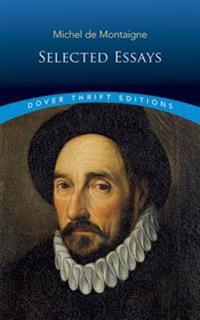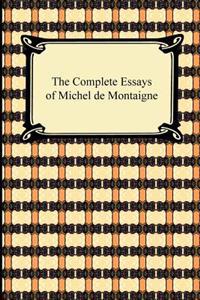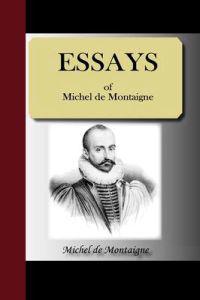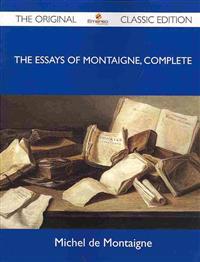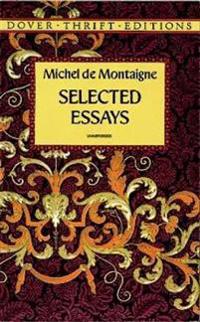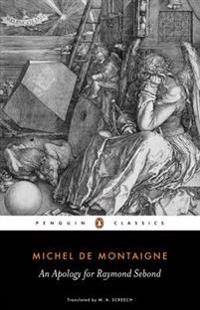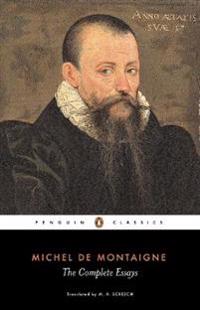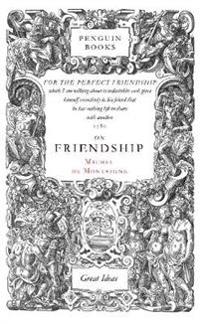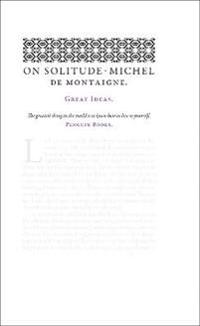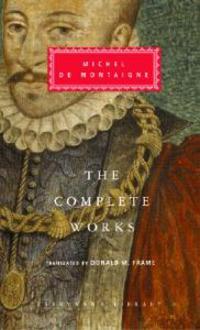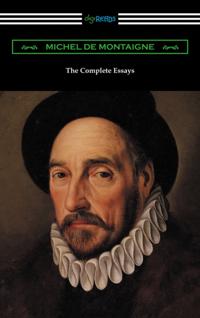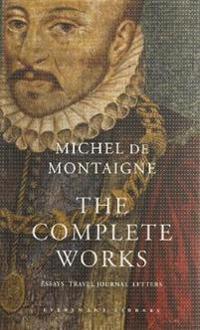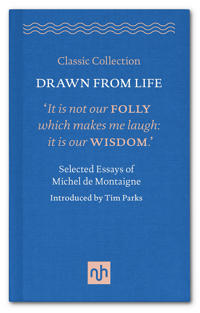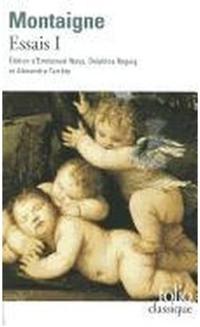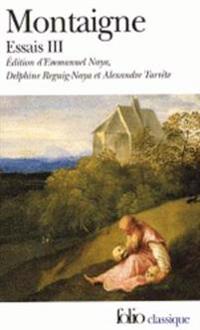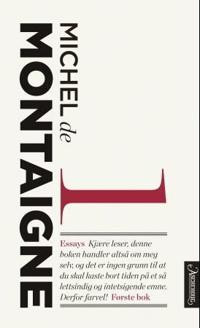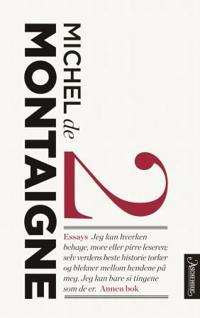Michel de Montaigne (Pocket)
avMichel De Montaigne, Charles Cotton, William Carew Hazlitt
ISBN: 9780486486031 - UTGIVEN: 201201One of France's great Renaissance thinkers, Montaigne was remarkably modern in his views. These highly readable essays reflect his thoughts on poetry, philosophy, theology, law, literature, education, and world exploration. Filled with aphorisms and anecdotes, enlivened by wordplay and a delightful [...]
The Complete Essays of Michel de Montaigne (Häftad)
avMichel de Montaigne
ISBN: 9781420934205 - UTGIVEN: 2009-01Essays of Michel de Montaigne (Inbunden)
avMichel de Montaigne
ISBN: 9781595475138 - UTGIVEN: 2009-06The Essays of Montaigne, Complete - The Original Classic Edition (Häftad)
avMichel de Montaigne
ISBN: 9781486144259 - UTGIVEN: 201206Selected Essays (Häftad)
avMichel de Montaigne, Montaigne
ISBN: 9780486291093 - UTGIVEN: 2013068 masterly essays by great French thinker: "Of Friendship," "Of Books," "Of Cruelty," "Of Repentance," four more. Classic Charles Cotton translation.
[...]Essä : urval och inledning av Arne Melberg (Häftad med flikar)
avArne Melberg, Francis Bacon, Michel De Montaigne, Robert Burton, Thomas Browne, Mme De Sévigné, , Ludvig Holberg
ISBN: 9789171734150 - UTGIVEN: 2013-11-15Under Michel de Montaignes 1500-tal betydde "essä" ungefär övning eller smakprov. Ordet fanns också som verb, essayer: pröva, testa. När Montaigne började skriva använde han ordet främst som ett aktivt verb som beskriver hans sökande och prövande texter. Efter några år av essäistisk ve[...]
Essays (Pocket)
avMichel De Montaigne
ISBN: 9780140178975 - UTGIVEN: 1993-03-25Revealing the author's thoughts on sexuality, religion, cannibals, intellectuals, and other unexpected themes, this work includes titles such as: "On Solitude," "To Philosophize Is to Learn How to Die," and "On Experience".[...]
An Apology for Raymond Sebond (Pocket)
avMichel De Montaigne
ISBN: 9780140444933 - UTGIVEN: 1988-01"An Apology for Raymond Sebond" is widely regarded as the greatest of Montaigne's essays: a supremely eloquent expression of Christian scepticism. An empassioned defence of Sebond's fifteenth-century treatise on natural theology, it was inspired by the deep crisis of personal melancholy that followe[...]
The Essays (Pocket)
avMichel De Montaigne
ISBN: 9780140446029 - UTGIVEN: 1993-08-26To overcome a crisis of melancholy after the death of his father, Montaigne withdrew to his country estates and began to write. This title discusses Montaigne's themes such as fathers and children, conscience and cowardice, and coaches and cannibals.[...]
The Complete Essays (Storpocket)
avMichel de Montaigne
ISBN: 9780140446043 - UTGIVEN: 199302In 1572, Montaigne retired to his estates in order to devote himself to leisure, reading and reflection. There he wrote his constantly expanding 'essays', inspired by the ideas he found in books from his library and his own experience. He discusses subjects as diverse as war-horses and cannibals, po[...]
On Friendship (Pocket)
avMichel de Montaigne
ISBN: 9780141018867 - UTGIVEN: 200409Throughout history, some books have changed the world. They have transformed the way we see ourselves - and each other. They have inspired debate, dissent, war and revolution. They have enlightened, outraged, provoked and comforted. They have enriched lives - and destroyed them. Now Penguin brings y[...]
On Solitude (Häftad)
avMichel de Montaigne
ISBN: 9780141043852 - UTGIVEN: 200908Blending intellectual speculation with anecdote and personal reflection, the Renaissance thinker and writer Montaigne pioneered the modern essay. This selection contains his idiosyncratic and timeless writings on subjects as varied as the virtues of solitude, the power of the imagination, the pleasu[...]
Michel De Montaigne (Pocket)
avAnn Hartle
ISBN: 9780521037815 - UTGIVEN: 2007-07Michel de Montaigne, the inventor of the essay, has always been acknowledged as a great literary figure but has never been thought of as a philosophical original. This book treats Montaigne as a serious thinker in his own right, taking as its point of departure Montaigne's description of himself as [...]
The Complete Works (Inbunden)
avMichel de Montaigne, Stuart Hampshire
ISBN: 9781400040216 - UTGIVEN: 200304Humanist, skeptic, acute observer of himself and others, Michel de Montaigne (1533--92) was the first to use the term "essay" to refer to the form he pioneered, and he has remained one of its most famous practitioners. He reflected on the great themes of existence in his wise and engaging writings, [...]
Complete Essays of Michel de Montaigne
ISBN: 9781420956283 - UTGIVEN: 2017-09With the goal of describing man with complete frankness and using himself as his most frequent example, Michel de Montaigne first published his "e;Essays"e; in 1580. This collection of 107 chapters encompasses a wide variety of subjects, originally inspired by his study of Latin classics, an[...]
The Complete Works (Inbunden)
avMichel de Montaigne
ISBN: 9781857152593 - UTGIVEN: 200304New translation of Montaigne into contemporary English.
Drawn from Life: Selected Essays of Michel de Montaigne
ISBN: 9781910749234 - UTGIVEN: 2016-10The Notting Hill Editions Classic Collection series brings together the great essayistsof the past, introduced by contemporary writers. Essays on the Self is a surprisingcollection spanning twenty-one years of Virginia Woolf s life, from the ages ofthirty-seven to fifty-eight, the year before her su[...]
Tagebuch der Reise nach Italien über die Schweiz und Deutschland von 180 bis 1581 (Inbunden)
avMichel de Montaigne
ISBN: 9783847703495 - UTGIVEN: 2014-01Essays; første bok (Pocket)
avMichel de Montaigne
ISBN: 9788203353628 - UTGIVEN: 2013Essays er en blanding av filosofiske meditasjoner, tekstkommentarer, memoarer og dagbøker. Første bok tar utgangspunkt i historiske og militære emner så vel som lærdom og undervisning, vennskap og ensomhet.[...]
Essays; annen bok (Pocket)
avMichel de Montaigne
ISBN: 9788203353635 - UTGIVEN: 2013Essays er en blanding av filosofiske meditasjoner, tekstkommentarer, memoarer og dagbøker. Annen bok dreier seg i stor grad om Montaignes livserfaringer og selvrefleksjon. Temaene veksler for øvrig mellom bøker og drukkenskap, mellom grusomhet og ære.[...]

